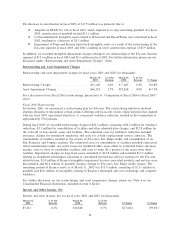Electronic Arts 2004 Annual Report Download - page 63
Download and view the complete annual report
Please find page 63 of the 2004 Electronic Arts annual report below. You can navigate through the pages in the report by either clicking on the pages listed below, or by using the keyword search tool below to find specific information within the annual report.products for diÅerent territories to address varying regulations. This additional product diÅerentiation would
be costly.
If we do not consistently meet our product development schedules, we will experience Öuctuations in our
operating results.
Our ability to meet product development schedules is aÅected by a number of factors, including the creative
processes involved, the coordination of large and sometimes geographically dispersed development teams
required by the increasing complexity of our products, and the need to reÑne and tune our products prior to
their release. We have in the past experienced development delays for several of our products. Failure to
meet anticipated production or ""go live'' schedules may cause a shortfall in our revenue and proÑtability and
cause our operating results to be materially diÅerent from expectations. Delays that prevent release of our
products during peak selling seasons or in conjunction with speciÑc events, such as the release of a related
movie or the beginning of a sports season or major sporting event, could adversely aÅect our Ñnancial
performance.
Technology changes rapidly in our business, and if we fail to anticipate new technologies, the quality,
timeliness and competitiveness of our products will suÅer.
Rapid technology changes in our industry require us to anticipate, sometimes years in advance, which
technologies our products must take advantage of in order to make them competitive in the market at the time
they are released. Therefore, we usually start our product development with a range of technical development
goals that we hope to be able to achieve. We may not be able to achieve these goals, or our competition may
be able to achieve them more quickly than we can. In either case, our products may be technologically inferior
to competitive products, or less appealing to consumers, or both. If we cannot achieve our technology goals
within the original development schedule of our products, then we may delay products until these technology
goals can be achieved, which may delay or reduce revenue and increase our development expenses.
Alternatively, we may increase the resources employed in research and development in an attempt to
accelerate our development of new technologies, either to preserve our product launch schedule or to keep up
with our competition, which would increase our development expenses.
If we do not continue to attract and retain key personnel, we will be unable to eÅectively conduct our
business.
The market for technical, creative, marketing and other personnel essential to the development and marketing
of our products and management of our businesses is extremely competitive. Our leading position within the
interactive entertainment industry makes us a prime target for recruiting of executives and key creative
talent. If we cannot successfully recruit and retain the employees we need, or replace key employees following
their departure, our ability to develop and manage our businesses will be impaired.
Our platform licensors are our chief competitors and frequently control the manufacturing of and/or
access to our videogame products. If they do not approve our products, we will be unable to ship to our
customers.
Our agreements with hardware licensors (such as Sony for the PlayStation 2, Microsoft for the Xbox and
Nintendo for the Nintendo GameCube) typically give signiÑcant control to the licensor over the approval and
manufacturing of our products, which could, in certain circumstances, leave us unable to get our products
approved, manufactured and shipped to customers. These hardware licensors are also our chief competitors.
In most events, control of the approval and manufacturing process by the platform licensors increases both our
manufacturing lead times and costs as compared to those we can achieve independently. While we believe
that our relationships with our hardware licensors are currently good, the potential for these licensors to
delay or refuse to approve or manufacture our products exists. Such occurrences would harm our business and
our Ñnancial performance.
48
























